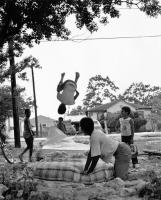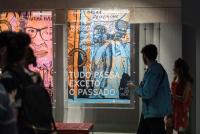 Despite the importance of chattel slavery to the making of Portugal and its overseas empire, this terrifying history of black bondage is entirely muted in the public memory of Lisbon. In contrast to the (recently established and far overdue) National Museum of African American History and Culture in the United States or the Museu Afro Brasilin São Paulo, Brazil, there are no such museums or reckoning public memorials in Lisbon along the lines of the Mémorial de l’Abolition d’Esclavage as in Nantes, France. More recently, however, a slavery museum was established in the historic “Mercado de Escravos” (Slave Market) of the southern Portuguese port of Lagos, which is said to be the site of the first trade in enslaved Africans in Europe. Yet, Lisbon remains largely silent on its legacy of white terror and black captivity.
Despite the importance of chattel slavery to the making of Portugal and its overseas empire, this terrifying history of black bondage is entirely muted in the public memory of Lisbon. In contrast to the (recently established and far overdue) National Museum of African American History and Culture in the United States or the Museu Afro Brasilin São Paulo, Brazil, there are no such museums or reckoning public memorials in Lisbon along the lines of the Mémorial de l’Abolition d’Esclavage as in Nantes, France. More recently, however, a slavery museum was established in the historic “Mercado de Escravos” (Slave Market) of the southern Portuguese port of Lagos, which is said to be the site of the first trade in enslaved Africans in Europe. Yet, Lisbon remains largely silent on its legacy of white terror and black captivity.
City
04.02.2021 | by Yesenia Barragan
 Hudnall records for posterity the architecture of weathered shotgun houses and the vibrant lives within them. He depicts people at ease, celebrating holidays, dressed in their Sunday finery, and kids in the thrall of summertime. “These are the young Floyds coming up,” he says. “They need to be cared for and guided. Rather than holding up a sign and marching for a day or two, then forgetting about it, come here, talk to people, get to know them.”
Hudnall records for posterity the architecture of weathered shotgun houses and the vibrant lives within them. He depicts people at ease, celebrating holidays, dressed in their Sunday finery, and kids in the thrall of summertime. “These are the young Floyds coming up,” he says. “They need to be cared for and guided. Rather than holding up a sign and marching for a day or two, then forgetting about it, come here, talk to people, get to know them.”
Games Without Borders
14.12.2020 | by Earlie Hudnall and Paul Moakley
 Funes’ condition contrasts with [Everything passes except the past], an international workshop about the politics of memory, promoted by the Goethe-Institut, which took place over a few days of September at Culturgest in Lisbon, in tandem with the cinema programme, Re imagining the post-colonial archive. Unlike Funes' condition this event was about reflecting on the relationship between remembering and forgetting the past.
Funes’ condition contrasts with [Everything passes except the past], an international workshop about the politics of memory, promoted by the Goethe-Institut, which took place over a few days of September at Culturgest in Lisbon, in tandem with the cinema programme, Re imagining the post-colonial archive. Unlike Funes' condition this event was about reflecting on the relationship between remembering and forgetting the past.
Afroscreen
18.02.2020 | by Inês Ponte
 The distance between the writer and the traumatic reality about which they write determines the result of literary attempts to convey the experience of violence. Nevertheless, there are similarities between the artistic representations of memory offered by direct witnesses of events and those re-elaborated by their descendants (those we call post-memories).
The distance between the writer and the traumatic reality about which they write determines the result of literary attempts to convey the experience of violence. Nevertheless, there are similarities between the artistic representations of memory offered by direct witnesses of events and those re-elaborated by their descendants (those we call post-memories).
To read
24.02.2019 | by Felipe Cammaert
 For many young people today, in Cape Verde, Guinea Bissau, Portugal, France, Brazil, the United States of America, Cabral represents the possibility of criticizing various forms of power, of resistance and of affirming their identities. The ways that Cabral has been taken up confirm that the originality of his praxis lies in its articulation of, and opposition to, different dimensions of domination and violence, from neo-colonialism to gender discrimination.
For many young people today, in Cape Verde, Guinea Bissau, Portugal, France, Brazil, the United States of America, Cabral represents the possibility of criticizing various forms of power, of resistance and of affirming their identities. The ways that Cabral has been taken up confirm that the originality of his praxis lies in its articulation of, and opposition to, different dimensions of domination and violence, from neo-colonialism to gender discrimination.
To read
04.08.2018 | by Sílvia Roque
 Travel in Monica de Miranda’s imagery becomes a metaphor for what Walter Mignolo calls ‘the colonial wound’: as a way to explore her multiple movements and those of her family through places linked by a common colonial matrix she builds her own emotional map in a variety of mediums. It could be argued that the stations chosen for her transit suggest a reflection on decolonization that in the Zapatistas’ terms would carry us towards a world that would fit many worlds: a proposal for a pluriversal -as in opposition to uni-versal - reading of reality.
Travel in Monica de Miranda’s imagery becomes a metaphor for what Walter Mignolo calls ‘the colonial wound’: as a way to explore her multiple movements and those of her family through places linked by a common colonial matrix she builds her own emotional map in a variety of mediums. It could be argued that the stations chosen for her transit suggest a reflection on decolonization that in the Zapatistas’ terms would carry us towards a world that would fit many worlds: a proposal for a pluriversal -as in opposition to uni-versal - reading of reality.
I'll visit
27.11.2012 | by Gabriela Salgado
 All over Africa there is a certain revival of an industry of culture and memory, or perhaps even the cult of memory. And perhaps that's good news.
All over Africa there is a certain revival of an industry of culture and memory, or perhaps even the cult of memory. And perhaps that's good news.
Afroscreen
15.05.2012 | by Pedro José-Marcellino aka P.J. Marcellino
 Despite the importance of chattel slavery to the making of Portugal and its overseas empire, this terrifying history of black bondage is entirely muted in the public memory of Lisbon. In contrast to the (recently established and far overdue) National Museum of African American History and Culture in the United States or the Museu Afro Brasilin São Paulo, Brazil, there are no such museums or reckoning public memorials in Lisbon along the lines of the Mémorial de l’Abolition d’Esclavage as in Nantes, France. More recently, however, a slavery museum was established in the historic “Mercado de Escravos” (Slave Market) of the southern Portuguese port of Lagos, which is said to be the site of the first trade in enslaved Africans in Europe. Yet, Lisbon remains largely silent on its legacy of white terror and black captivity.
Despite the importance of chattel slavery to the making of Portugal and its overseas empire, this terrifying history of black bondage is entirely muted in the public memory of Lisbon. In contrast to the (recently established and far overdue) National Museum of African American History and Culture in the United States or the Museu Afro Brasilin São Paulo, Brazil, there are no such museums or reckoning public memorials in Lisbon along the lines of the Mémorial de l’Abolition d’Esclavage as in Nantes, France. More recently, however, a slavery museum was established in the historic “Mercado de Escravos” (Slave Market) of the southern Portuguese port of Lagos, which is said to be the site of the first trade in enslaved Africans in Europe. Yet, Lisbon remains largely silent on its legacy of white terror and black captivity.  Hudnall records for posterity the architecture of weathered shotgun houses and the vibrant lives within them. He depicts people at ease, celebrating holidays, dressed in their Sunday finery, and kids in the thrall of summertime. “These are the young Floyds coming up,” he says. “They need to be cared for and guided. Rather than holding up a sign and marching for a day or two, then forgetting about it, come here, talk to people, get to know them.”
Hudnall records for posterity the architecture of weathered shotgun houses and the vibrant lives within them. He depicts people at ease, celebrating holidays, dressed in their Sunday finery, and kids in the thrall of summertime. “These are the young Floyds coming up,” he says. “They need to be cared for and guided. Rather than holding up a sign and marching for a day or two, then forgetting about it, come here, talk to people, get to know them.”  Funes’ condition contrasts with [Everything passes except the past], an international workshop about the politics of memory, promoted by the Goethe-Institut, which took place over a few days of September at Culturgest in Lisbon, in tandem with the cinema programme, Re imagining the post-colonial archive. Unlike Funes' condition this event was about reflecting on the relationship between remembering and forgetting the past.
Funes’ condition contrasts with [Everything passes except the past], an international workshop about the politics of memory, promoted by the Goethe-Institut, which took place over a few days of September at Culturgest in Lisbon, in tandem with the cinema programme, Re imagining the post-colonial archive. Unlike Funes' condition this event was about reflecting on the relationship between remembering and forgetting the past.  The distance between the writer and the traumatic reality about which they write determines the result of literary attempts to convey the experience of violence. Nevertheless, there are similarities between the artistic representations of memory offered by direct witnesses of events and those re-elaborated by their descendants (those we call post-memories).
The distance between the writer and the traumatic reality about which they write determines the result of literary attempts to convey the experience of violence. Nevertheless, there are similarities between the artistic representations of memory offered by direct witnesses of events and those re-elaborated by their descendants (those we call post-memories).  For many young people today, in Cape Verde, Guinea Bissau, Portugal, France, Brazil, the United States of America, Cabral represents the possibility of criticizing various forms of power, of resistance and of affirming their identities. The ways that Cabral has been taken up confirm that the originality of his praxis lies in its articulation of, and opposition to, different dimensions of domination and violence, from neo-colonialism to gender discrimination.
For many young people today, in Cape Verde, Guinea Bissau, Portugal, France, Brazil, the United States of America, Cabral represents the possibility of criticizing various forms of power, of resistance and of affirming their identities. The ways that Cabral has been taken up confirm that the originality of his praxis lies in its articulation of, and opposition to, different dimensions of domination and violence, from neo-colonialism to gender discrimination.  Travel in Monica de Miranda’s imagery becomes a metaphor for what Walter Mignolo calls ‘the colonial wound’: as a way to explore her multiple movements and those of her family through places linked by a common colonial matrix she builds her own emotional map in a variety of mediums. It could be argued that the stations chosen for her transit suggest a reflection on decolonization that in the Zapatistas’ terms would carry us towards a world that would fit many worlds: a proposal for a pluriversal -as in opposition to uni-versal - reading of reality.
Travel in Monica de Miranda’s imagery becomes a metaphor for what Walter Mignolo calls ‘the colonial wound’: as a way to explore her multiple movements and those of her family through places linked by a common colonial matrix she builds her own emotional map in a variety of mediums. It could be argued that the stations chosen for her transit suggest a reflection on decolonization that in the Zapatistas’ terms would carry us towards a world that would fit many worlds: a proposal for a pluriversal -as in opposition to uni-versal - reading of reality.  All over Africa there is a certain revival of an industry of culture and memory, or perhaps even the cult of memory. And perhaps that's good news.
All over Africa there is a certain revival of an industry of culture and memory, or perhaps even the cult of memory. And perhaps that's good news. 